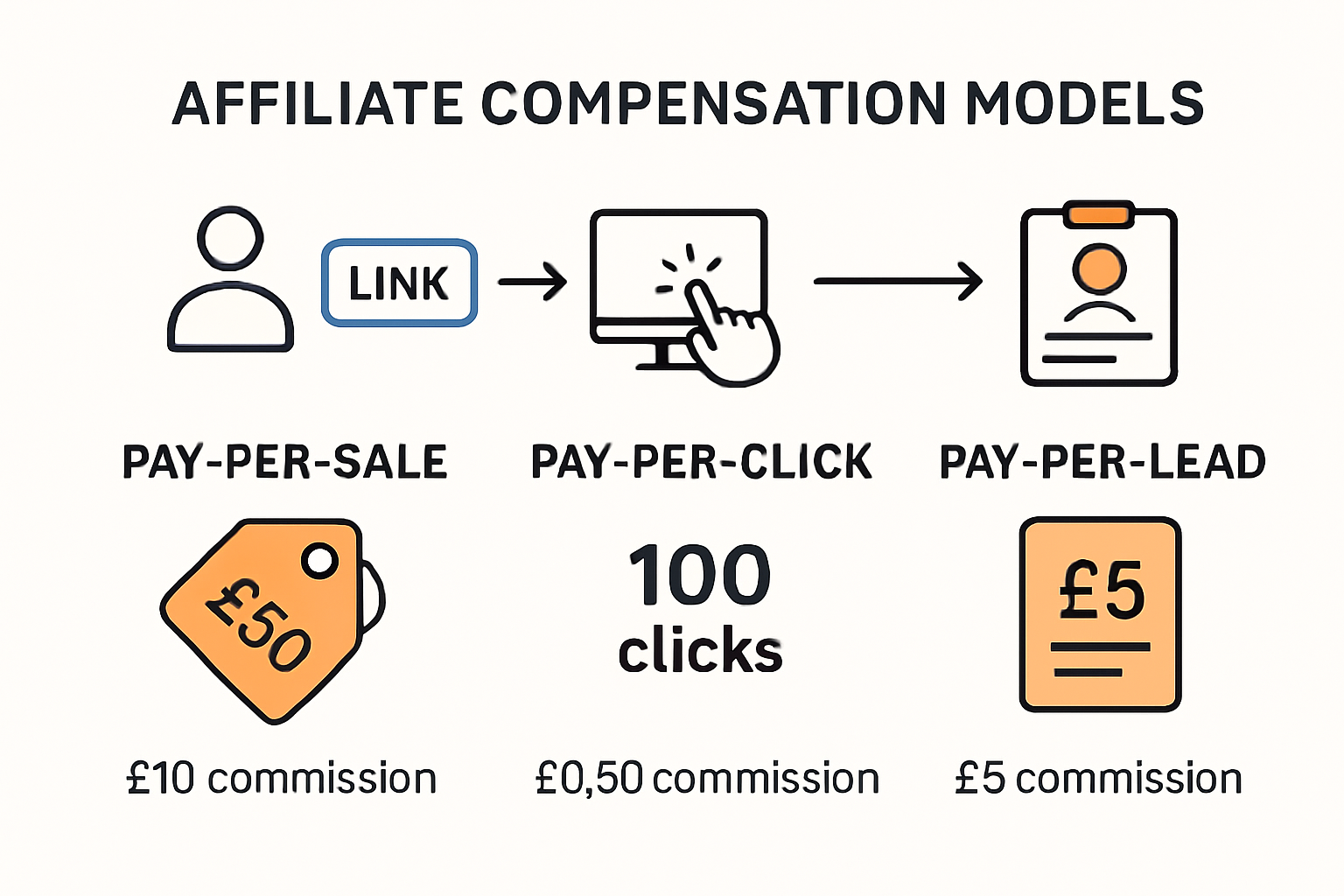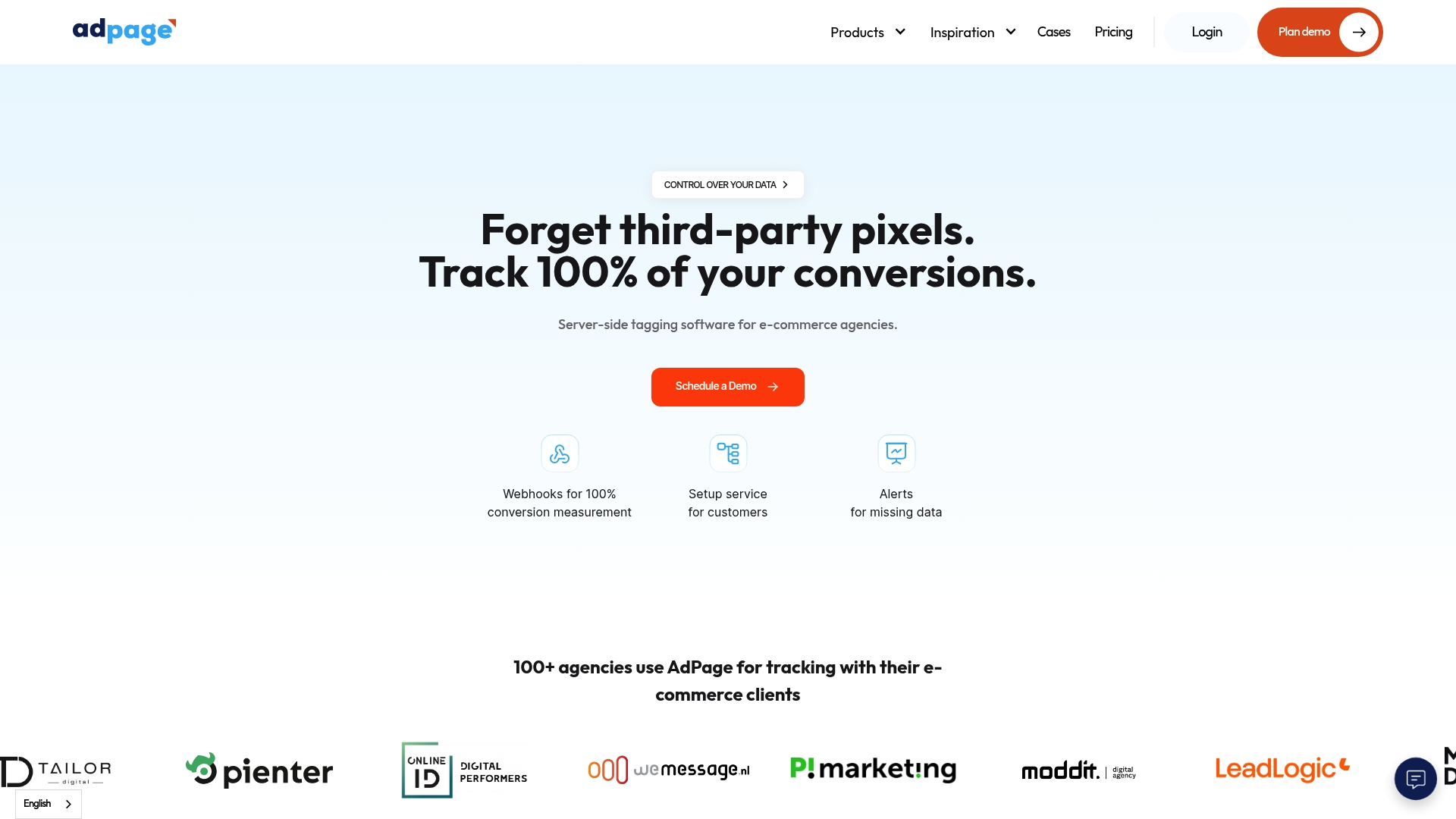Affiliate programmes are reshaping how brands and creators earn online, connecting businesses with fresh customers using simple referral links. It sounds like another marketing trend, but the numbers say otherwise. Global affiliate marketing spend is set to exceed £10 billion this year and this momentum is not just hype. The real surprise is that these programmes let brands grow fast without the risk or expense of old-school adverts, opening up a path to smarter marketing that barely existed a decade ago.
Table of Contents
- Understanding What Affiliate Programs Are
- How Affiliate Programs Benefit Businesses
- Integrating Affiliate Marketing with Analytics
- Choosing the Right Affiliate Program for Growth
Quick Summary
| Takeaway | Explanation |
|---|---|
| Leverage affiliate programs for cost-effective marketing | Businesses only pay for successful conversions, reducing financial risk and upfront costs. |
| Utilise advanced tracking to optimise performance | Employ detailed analytics to measure key metrics and refine affiliate strategies for better outcomes. |
| Select affiliates aligned with your target audience | Choose partners that resonate with your demographic for authentic marketing relationships and improved engagement. |
| Build meaningful partnerships for sustainability | Foster trust and open communication with affiliates to create long-lasting collaborations that benefit both parties. |
| Explore various compensation models for affiliates | Offer competitive commission structures like Pay-per-Sale, Pay-per-Click, and Pay-per-Lead to motivate partners effectively. |
Understanding What Affiliate Programs Are
Affiliate programs represent a powerful digital marketing strategy that enables businesses to expand their reach and generate revenue through strategic partnerships. These collaborative marketing arrangements create mutually beneficial relationships between brands and content creators who promote products or services.
The Fundamental Mechanics of Affiliate Programs
At its core, an affiliate program is a performance-based marketing model where businesses compensate external partners for driving specific actions. Oxford Reference defines these programs as arrangements where affiliates place links on their websites and receive compensation when predetermined actions are completed.
The mechanism is straightforward yet sophisticated. An affiliate receives a unique tracking link that connects their content to the merchant’s product. When a user clicks this link and completes a desired action such as making a purchase, the affiliate earns a predetermined commission. This model transforms traditional advertising by creating a performance-driven ecosystem where marketing success is directly tied to measurable outcomes.
Types of Compensation and Performance Metrics
Below is a table summarising the main types of affiliate compensation models alongside their descriptions, as discussed in the section. This will help readers quickly compare the different approaches to incentivising affiliates.
| Compensation Model | Description |
|---|---|
| Pay-per-Sale | Affiliates receive a percentage of the total sale amount |
| Pay-per-Click | Compensation based on the number of user clicks generated |
| Pay-per-Lead | Earnings for each qualified lead or signup |
Affiliate programs typically offer various compensation structures to motivate partners. Wikipedia highlights that these can include:
- Pay-per-Sale: Affiliates receive a percentage of the total sale amount
- Pay-per-Click: Compensation based on the number of user clicks generated
- Pay-per-Lead: Earnings for each qualified lead or signup

Successful affiliate programs focus on creating transparent, attractive incentive models that align the interests of merchants and affiliates. By offering competitive commission rates and providing robust tracking tools, businesses can build robust networks of motivated marketing partners.
The strategic value of affiliate programs extends beyond immediate sales. They enable brands to leverage diverse marketing channels, tap into new audience segments, and create scalable marketing infrastructures that adapt dynamically to changing market conditions. For content creators and digital marketers, these programs offer opportunities to monetise their platforms while providing genuine value to their audiences through relevant, targeted product recommendations.
How Affiliate Programs Benefit Businesses
Affiliate programs have emerged as a strategic powerhouse for businesses seeking cost-effective and performance-driven marketing solutions. These innovative partnerships provide organisations with unique opportunities to expand their market reach, reduce customer acquisition costs, and generate sustainable revenue streams.
Cost-Effective Marketing and Risk Mitigation
One of the most compelling advantages of affiliate programs is their inherent cost efficiency. Research from the Wharton School demonstrates that businesses can leverage third-party partners to broaden distribution channels while minimising upfront marketing expenditures. Unlike traditional advertising models that require substantial initial investments, affiliate marketing operates on a performance-based framework where businesses only pay for successful conversions.
This model significantly reduces financial risk. Companies can allocate marketing budgets more strategically, knowing that compensation is directly tied to measurable outcomes such as sales, leads, or clicks. By transferring a portion of marketing responsibility to affiliates, businesses can access diverse audience segments without bearing the entire promotional burden.
Expanding Market Reach and Brand Visibility
Affiliate programs serve as powerful mechanisms for amplifying brand visibility across multiple digital platforms. Content creators, bloggers, influencers, and niche website owners become brand ambassadors, introducing products to audiences that might otherwise remain unreached. Each affiliate represents a unique entry point into potential customer networks, effectively decentralising marketing efforts.
The diversity of affiliate partnerships enables businesses to target specific demographic groups with unprecedented precision. A technology blog might introduce a software product to tech enthusiasts, while a lifestyle influencer could showcase fashion accessories to their dedicated followers. This targeted approach ensures that marketing messages resonate with genuinely interested audiences, improving conversion potential.
Performance Tracking and Scalable Growth
Modern affiliate programs are underpinned by sophisticated tracking technologies that provide granular insights into marketing performance. Advanced analytics platforms enable businesses to monitor key metrics in real-time, including click-through rates, conversion percentages, and revenue generated per affiliate. Learn more about tracking conversion strategies.
These data-driven insights allow companies to continuously refine their affiliate strategies, identifying top-performing partners and optimising commission structures. As businesses gain more understanding of their affiliate network’s dynamics, they can progressively scale their programs, recruiting high-quality partners and expanding their digital marketing ecosystem.
The transformative potential of affiliate programs extends far beyond traditional marketing approaches. By creating mutually beneficial partnerships, businesses can unlock new revenue channels, mitigate marketing risks, and build robust, adaptable promotional strategies that evolve with changing market dynamics.
Integrating Affiliate Marketing with Analytics
Affiliate marketing analytics represent a critical component of modern digital marketing strategies, enabling businesses to transform raw data into actionable insights that drive performance and optimise revenue generation. By implementing robust tracking and analytical frameworks, organisations can unlock deeper understanding of their affiliate marketing ecosystem.
Advanced Tracking and Performance Measurement
Google News Initiative highlights the importance of precise tracking mechanisms in affiliate marketing. Modern analytics platforms allow marketers to capture granular data points including click-through rates, conversion paths, and revenue attribution across multiple affiliate channels.
Effective tracking goes beyond simple metrics. Sophisticated analytics tools enable businesses to map complex customer journeys, understanding how different affiliates contribute to the overall conversion funnel. This multi-touch attribution approach provides a nuanced view of each affiliate’s performance, moving beyond traditional last-click models.
Strategic Data Integration and Modelling
The Performance Marketing Association emphasises the critical role of integrating affiliate marketing data into broader media mix modeling. By incorporating affiliate performance metrics into comprehensive marketing analytics, businesses can develop more holistic strategies that account for the complex interactions between different marketing channels.
Learn more about advanced web analytics techniques to enhance your understanding of data integration. These advanced approaches enable marketers to:
- Segment Performance: Identify top-performing affiliates
- Predict Trends: Forecast potential revenue streams
- Optimise Strategies: Refine commission structures based on empirical data
Data Quality and Compliance Considerations
A scholarly review by Stephen L. France and Sanjoy Ghose underscores the significance of maintaining high-quality, reliable data in marketing analytics. In the context of affiliate marketing, this means implementing rigorous tracking protocols that ensure:
- Accurate conversion tracking
- Protection of user privacy
- Transparent reporting mechanisms
- Compliance with data protection regulations
The integration of affiliate marketing with advanced analytics transforms what was once a straightforward commission-based model into a sophisticated, data-driven ecosystem. By leveraging cutting-edge tracking technologies and analytical frameworks, businesses can unlock unprecedented insights into their marketing performance, driving more strategic decision-making and sustainable growth.
Choosing the Right Affiliate Program for Growth
Selecting the appropriate affiliate program is a strategic decision that can significantly impact a business’s digital marketing success. The right partnership can unlock exponential growth potential, while a misaligned program can lead to wasted resources and missed opportunities.
Aligning Program Selection with Business Objectives
The U.S. Chamber of Commerce emphasises the critical importance of selecting products and services that authentically resonate with your target audience. This alignment is fundamental to creating meaningful marketing partnerships that drive genuine value.
Businesses must conduct thorough audience research to understand their demographic’s preferences, needs, and purchasing behaviours. By mapping these insights against potential affiliate programs, organisations can identify partnerships that feel natural and compelling. For instance, a technology blog would likely find more success promoting software and digital tools rather than unrelated consumer products.
Evaluating Commission Structures and Program Requirements
Forbes advises businesses to meticulously assess the financial implications of different affiliate programs. This involves examining commission rates, payment thresholds, and the overall economic viability of potential partnerships.
Key considerations include:
- Commission Rates: Competitive percentages that motivate affiliates
- Payment Frequency: Regular and predictable compensation schedules
- Tracking Capabilities: Robust systems for accurate conversion monitoring
Discover advanced strategies for marketing growth to complement your affiliate program selection process. Understanding the nuanced metrics behind successful partnerships can dramatically improve your strategic approach.
Building Sustainable Affiliate Relationships
The National Association for the Self-Employed highlights that successful affiliate programs transcend mere transactional relationships. They represent strategic partnerships built on mutual trust, shared values, and aligned marketing objectives.
To cultivate these relationships, businesses should:
- Provide comprehensive marketing resources
- Offer responsive support
- Create transparent communication channels
- Develop performance-based incentive structures
Successful affiliate program selection is not about finding the highest paying option, but discovering partnerships that create genuine value for all stakeholders. By approaching affiliate marketing as a collaborative growth strategy, businesses can develop robust networks that drive sustainable expansion and create meaningful connections with new audience segments.

Frequently Asked Questions
What is an affiliate program?
An affiliate program is a performance-based marketing arrangement where businesses compensate external partners (affiliates) for driving specific actions, such as sales or leads, through unique tracking links.
How do affiliates earn commissions through these programs?
Affiliates earn commissions based on various compensation models, including Pay-per-Sale (a percentage of total sales), Pay-per-Click (payment for clicks generated), and Pay-per-Lead (earning for qualified leads or signups).
What are the benefits of affiliate programs for businesses?
Affiliate programs help businesses minimise marketing costs, expand market reach, and track performance effectively, ultimately leading to higher revenue and reduced risks associated with traditional advertising.
How can businesses choose the right affiliate program?
Businesses should align their program selections with their objectives by assessing the relevance of products to their target audience, evaluating commission structures, and focusing on building sustainable relationships with affiliates.
Unlock Seamless Affiliate Performance with Precision Tracking
Affiliate marketing is only as powerful as your data. If you have ever struggled with lost conversions, unreliable analytics, or the uncertainty of data gaps, you know how frustrating it can be to scale your affiliate programme confidently. The article highlights the importance of accurate performance tracking, data-driven decisions, and reliable compensation models for sustainable growth. However, the truth is that many marketers lose out on opportunities because traditional tracking methods miss critical conversions or fail to comply with the latest privacy regulations.

Why not experience what complete data accuracy feels like? Move beyond guesswork and wasted ad spend. AdPage empowers you to monitor 100 percent of your conversions through advanced server-side tagging, robust consent management, and seamless integration with platforms such as Shopify and WooCommerce. Ready to see a difference in your affiliate ROI? Explore all features and book a free onboarding session today to start transforming your affiliate partnerships into measurable growth.



.png)
